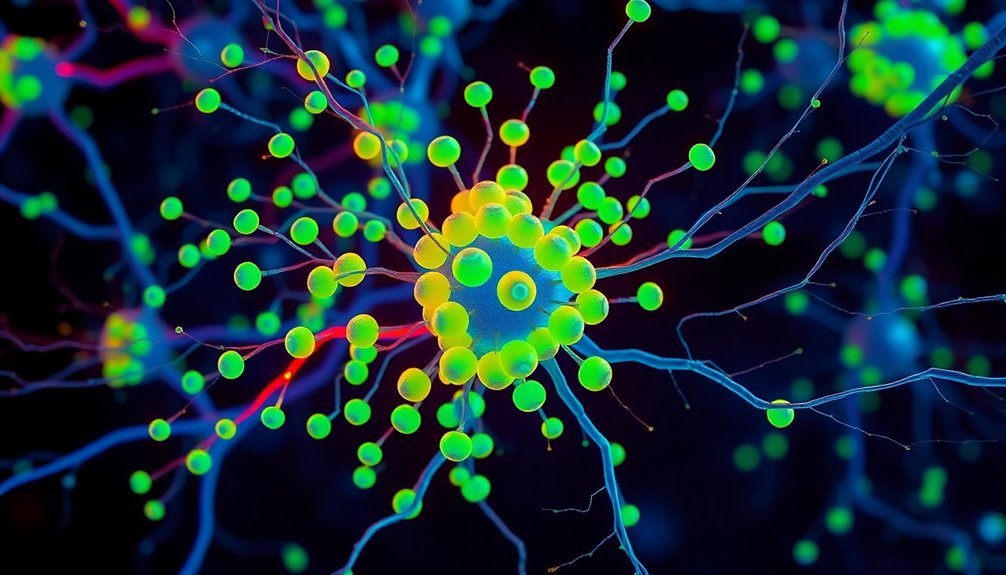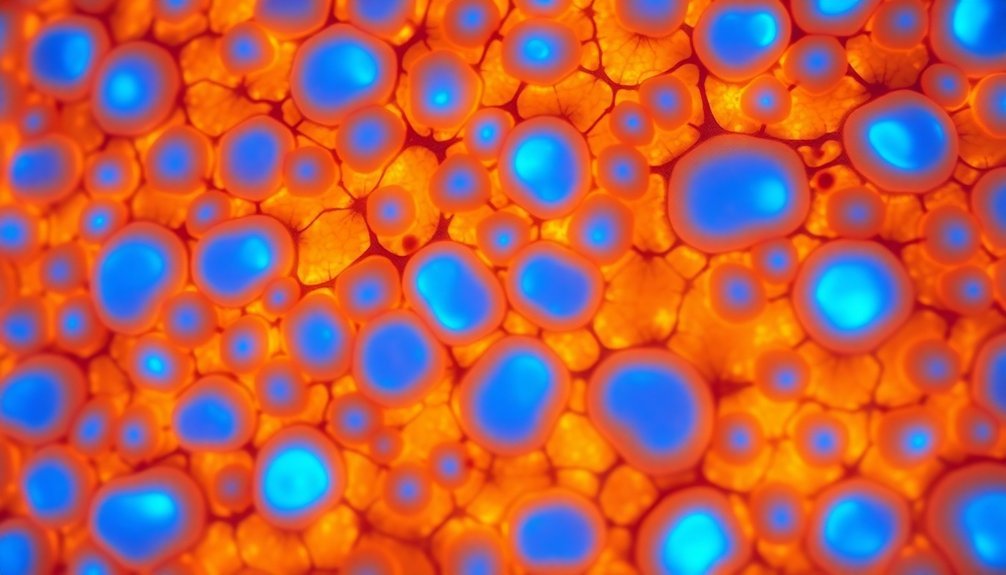Your brain's performance relies heavily on tiny cellular powerhouses called mitochondria, which generate over 90% of your brain's energy needs. Though your brain only makes up 2% of your body weight, it demands 20% of your total energy – with most of this power going to support thinking, memory formation, and neural signaling. When your mitochondria function at their best, they boost cognitive performance, enhance learning ability, and maintain sharp mental clarity. But when these power plants struggle, you'll notice reduced focus and memory issues. Understanding how to support your mitochondrial health opens the door to peak mental performance.
Understanding Your Brain's Power Plants

Your brain's power stations – mitochondria – are microscopic yet mighty organelles that generate the energy needed for every thought, memory, and action. These cellular powerhouses work tirelessly to produce ATP, the chemical fuel that powers your brain's countless biochemical reactions.
Your brain is particularly dependent on these energy factories, consuming over 20% of your body's total oxygen metabolism despite being only a fraction of your body weight.
Within each neuron, mitochondria position themselves strategically at both presynaptic and postsynaptic sites, ensuring reliable energy supply for neural transmission. They're not just static structures; your mitochondria constantly undergo fission and fusion, adapting to your brain's energy demands. They also serve as essential calcium buffering units that help regulate neuronal signaling. You'll find more mitochondria in cells that need more energy, which is why neurons are particularly rich in these organelles.
Your mitochondria's health directly impacts your brain's performance through complex processes like the Krebs cycle and electron transport chain. They're also responsible for controlling reactive oxygen species levels and managing cellular death through apoptosis.
When your mitochondria function at their best, they support neuroplasticity – your brain's ability to form new neural connections and adapt to new experiences.
Mitochondria and Cognitive Performance
The intimate connection between mitochondrial health and cognitive performance shapes every aspect of your mental capabilities. When your mitochondria function at their best, they produce abundant ATP, providing the essential energy your brain needs for memory formation, learning, and problem-solving. Think of your mitochondria as tiny power plants that keep your cognitive abilities sharp and responsive.
Your brain's resilience and adaptability depend heavily on these cellular powerhouses. When mitochondrial function declines, you'll likely experience cognitive difficulties, including memory problems and reduced mental clarity. Research reveals that decreased mitochondrial DNA directly correlates with poorer working memory performance.
This decline can accelerate with age, stress, and environmental toxins, making you more susceptible to cognitive impairment and mental health challenges.
You can actively protect and enhance your mitochondrial health through specific lifestyle choices. Regular exercise stimulates mitochondrial function, while a nutrient-rich diet reduces oxidative stress that can damage these essential organelles.
Managing your stress levels and maintaining healthy sleep patterns also play important roles in preserving mitochondrial health. By supporting your mitochondria's function, you're investing in your brain's long-term performance and protecting yourself against age-related cognitive decline.
Brain Energy Demands Explained

Your brain's energy demands aren't evenly distributed, with synaptic processes consuming about 80% of available ATP while different regions require varying levels of power for efficient function.
The ATP production pipeline must maintain a constant energy supply despite fluctuating demands, as your brain accounts for 20% of your body's total energy consumption.
Within your daily brain power budget, you'll find that focused attention requires trade-offs, where increased energy use in one area results in decreased availability for other cognitive processes. Activities like vesicle recycling and neurotransmitter synthesis contribute significantly to your brain's high energy requirements.
Energy Costs By Region
Inside our brain's intricate network, energy demands vary dramatically by region, with gray matter requiring substantially more power than white matter for its intensive signaling processes.
Your brain's cerebral cortex uses about 75% of its energy just for signaling, while different networks consume varying amounts based on their functions.
You'll find that your sensory-motor networks operate more efficiently with lower energy costs, while your fronto-parietal networks demand higher energy investments. These energy demands can be up to 67% higher in evolutionarily expanded areas compared to basic sensory regions.
When you're speaking, Broca's area increases its energy consumption to handle the complex task of speech production. However, these task-specific increases are relatively modest, typically no more than 8% above baseline metabolism.
Your brain maintains this careful energy distribution through neurotransmitter cycling, particularly glutamate and GABA, which accounts for a significant portion of cortical energy use.
The regions with abundant neuromodulators require extra energy, especially for long-lasting G protein-coupled processes. This distribution isn't random – it reflects a calculated trade-off between signaling efficiency and modulation, ensuring your brain can maintain both its baseline functions and respond to specific cognitive demands.
ATP Production Pipeline
Power plants within your neurons, mitochondria orchestrate a complex ATP production pipeline that fuels every aspect of brain function. Your brain's energy factory operates through three main pathways, with oxidative phosphorylation generating the bulk of your ATP supply.
| Process | Key Features |
|---|---|
| Glycolysis | Converts glucose to ATP using NAD+ as cofactor |
| TCA Cycle | Processes acetyl-CoA in mitochondria for ATP |
| Oxidative Phosphorylation | Produces majority of neuronal ATP supply |
You're constantly using about 20% of your body's total energy just for brain function, with neurons consuming up to 80% of that share. Your mitochondria don't just blindly produce ATP – they're sophisticated energy regulators that can adjust production based on your synaptic activity. Through proteins like MICU3 and careful calcium ion management, your brain's mitochondria can rapidly boost ATP production when specific regions need more power.
When you're engaging in demanding cognitive tasks, your brain's limited energy supply means it must carefully allocate resources. This energy distribution isn't uniform – it's precisely targeted to areas of highest activity, ensuring your most critical neural processes get the ATP they need.
Daily Brain Power Budget
Despite remaining relatively stable throughout the day, your brain's energy budget represents a significant metabolic investment, consuming roughly 320 calories daily for basic functions and cognitive processes. Even when you're tackling complex mental tasks, your brain's energy consumption only increases by about 5-8% above its baseline needs.
Your brain's energy efficiency might surprise you – while individual thoughts don't cost much, maintaining the machinery that enables thinking requires substantial resources.
Consider these daily energy demands:
- Your baseline brain function, including maintaining alertness and supporting intrinsic activities, consumes most of your neural energy budget
- When learning a new instrument or mastering a complex skill, you might burn up to 200 additional calories over an 8-hour period
- Your brain's energy consumption stays remarkably consistent between day and night, with minimal fluctuation
The majority of your brain's energy – about 75-80% – goes toward neuronal signaling and synapse formation. This high energy demand makes your brain particularly sensitive to factors that affect mitochondrial health, including diet, sleep quality, and physical activity levels.
Protecting Brain Cell Energy
Your brain's mitochondria work tirelessly as cellular powerhouses, converting glucose into ATP through complex processes like glycolysis and oxidative phosphorylation.
These essential organelles employ protective mechanisms against cellular stress, with glial cells and neurons working together to maintain efficient energy production and prevent damage.
You can support your brain's energy systems through lifestyle choices that promote mitochondrial health, including proper nutrition and regular exercise.
Mitochondrial Energy Production Basics
Nestled within nearly every cell of your brain, mitochondria serve as microscopic powerhouses that generate the energy needed for cognitive function. These oval-shaped organelles contain two distinct membranes, with the inner membrane folded into cristae where the essential electron transport chain (ETC) operates.
Your mitochondria produce energy through a remarkable process called oxidative phosphorylation. They transform nutrients into ATP, your brain's primary energy currency, through a series of precise chemical reactions.
When you consume food, your cells break down nutrients to create NADH, which delivers high-energy electrons to the ETC. This powers a proton pump that creates an energy gradient, much like a biological battery.
Picture your mitochondria's energy production system as:
- A molecular assembly line where electrons flow through protein complexes like workers passing parts
- A microscopic hydroelectric dam, where protons flow through ATP synthase like water through turbines
- A cellular power grid, distributing ATP energy molecules throughout your brain cells
This efficient system produces up to 20 times more energy than simpler processes, providing your brain with the substantial power it needs to maintain cognitive function and form new neural connections.
Fighting Brain Cell Stress
The brain's remarkable protective mechanisms work tirelessly to shield your neurons from stress and damage. At the heart of this defense system are your mitochondria, which act as both stress sensors and protectors. They communicate stress signals throughout your body using specialized molecules called mitokines, helping your cells adapt to challenging conditions.
Your brain's protection strategy relies heavily on the partnership between neurons and astrocytes, specialized cells that guard against oxidative stress.
When you're under stress, astrocytes activate the Nrf2 pathway, triggering protective genes that help maintain your brain's energy balance. This defense system is precisely calibrated at your synapses, ensuring efficient energy use where it's needed most.
If your mitochondria aren't functioning properly, you're more vulnerable to anxiety, depression, and inflammation. However, healthy mitochondria can buffer against stress and enhance your emotional resilience.
They're particularly active in your adrenal glands, producing stress hormones that coordinate your body's response to challenges. Understanding these protective mechanisms has opened new therapeutic possibilities, especially for treating neurodegenerative conditions and improving brain function through targeted interventions in the astrocyte signaling pathway.
Energy Balance Through Lifestyle
Living an energy-conscious lifestyle holds the key to protecting your brain's mitochondrial health. Your daily choices directly impact how efficiently your cellular powerhouses produce energy, ultimately affecting your cognitive performance and mental clarity.
To maintain ideal brain energy, you'll need to focus on three core lifestyle pillars:
- Regular physical activity, particularly strength training, which increases your mitochondrial density and promotes the formation of new neural connections
- Quality sleep cycles of 7-8 consecutive hours, allowing your brain to repair and regenerate cellular components
- Anti-inflammatory nutrition following Mediterranean diet principles, rich in omega-3s and whole foods
You can enhance these foundational practices by incorporating stress management techniques and avoiding high-sugar, saturated-fat foods that trigger oxidative stress.
When you exercise, you're not just building muscle – you're creating new mitochondria and improving their efficiency. Supporting these efforts with targeted supplements like Coenzyme Q10 and maintaining proper nutrient intake helps enhance your brain's energy production.
Light Therapy for Brain Health

Progress in neuroscience has revealed light therapy as a promising treatment for enhancing brain health and function. Using specialized helmets that emit near-infrared light, this therapy penetrates your scalp and skull to boost your brain's energy production through increased ATP in mitochondria.
When you undergo light therapy, you'll experience improved brain connectivity, particularly within the first two weeks of treatment. The therapy works by enhancing blood flow and supporting neuroplasticity, which helps your brain form new connections and memories.
It's particularly effective during the acute-to-subacute recovery phase, where studies have shown measurable improvements in brain region connectivity.
You'll find that light therapy's benefits extend beyond basic brain function. It reduces inflammation and oxidative stress while promoting cellular repair.
Clinical trials have consistently demonstrated its safety and effectiveness, especially in cases of moderate traumatic brain injury. While researchers are still studying the long-term effects, you might get the best results by combining light therapy with cognitive rehabilitation.
This emerging treatment shows particular promise in supporting your brain's natural healing processes by targeting mitochondrial function, which is essential for peak brain performance.
Optimizing Mitochondrial Brain Function
Building on light therapy's impact on mitochondrial function, enhancing your brain's cellular powerhouses involves multiple lifestyle factors working in harmony. Your brain's mitochondria thrive when you combine proper nutrition, regular exercise, and effective stress management strategies.
Start by focusing on antioxidant-rich foods and essential nutrients that support mitochondrial health. You'll want to include B vitamins from leafy greens, CoQ10 from fatty fish, and magnesium from nuts and seeds. Consider implementing intermittent fasting to enhance mitochondrial biogenesis and metabolic flexibility.
Physical activity is non-negotiable for top-notch brain mitochondria. Here's what happens when you exercise regularly:
- Your neurons create new mitochondria, increasing their energy production capacity
- Your brain removes damaged mitochondria through mitophagy, maintaining cellular health
- Your body reduces inflammation, creating an ideal environment for mitochondrial function
Don't overlook the importance of quality sleep and stress management. Aim for 7-8 hours of consistent sleep while practicing mindfulness to reduce chronic stress.
If needed, consider targeted supplements like CoQ10, NAD+, or PQQ to support your mitochondrial health, but remember that they work best when combined with healthy lifestyle practices.
Frequently Asked Questions
Can Mitochondrial Damage From Past Lifestyle Choices Be Reversed?
Yes, you can reverse mitochondrial damage through consistent exercise, intermittent fasting, and proper nutrition. Your body actively creates new mitochondria when you adopt healthy lifestyle changes and use targeted supplements like PQQ.
How Do Environmental Toxins Specifically Impact Mitochondrial Function in the Brain?
Environmental toxins disrupt your brain's mitochondria by increasing oxidative stress, damaging DNA, disrupting energy production, and triggering cell death. They'll also impair mitochondrial dynamics and promote inflammation in your neural tissue.
What Role Do Genetics Play in Determining Individual Mitochondrial Efficiency?
Your genes directly influence your mitochondrial efficiency through inherited DNA variations that affect energy production, protein synthesis, and cellular signaling. These genetic factors determine how well your mitochondria function and produce ATP.
How Does Alcohol Consumption Affect Mitochondrial Performance in Brain Cells?
When you drink alcohol, it disrupts your brain's mitochondrial function by impairing energy production, altering mitochondrial shape, and reducing ATP levels. This damage can persist even after a single drinking episode.
Can Certain Medications Negatively Impact Mitochondrial Function in the Brain?
Yes, you'll find that statins, antipsychotics, and some antidepressants can harm your brain's mitochondrial function by increasing oxidative stress, disrupting energy production, and altering membrane potential in your neural cells.
In Summary
Your brain's mitochondrial health directly impacts your cognitive abilities and energy levels. You'll notice improved mental clarity, focus, and memory when you prioritize these cellular powerhouses through lifestyle choices. By optimizing your mitochondrial function with proper nutrition, exercise, light exposure, and stress management, you're investing in your brain's long-term performance. Take action today to protect your neural energy production and maintain peak mental function.





Leave a Reply